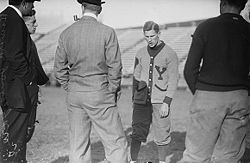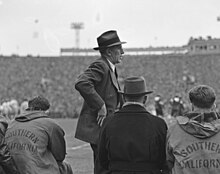Howard Jones (American football coach)
Yale's 15–0 victory over Syracuse in 1909 was significant in that it was the first time that two brothers had ever faced each other as opposing head coaches.
After the 1909 season, Howard Jones served a one-year stint as head football coach at Ohio State University in 1910, leading the Buckeyes to a 6–1–3 record.
Reed Lane, a businessman on the Iowa Athletic Board, was a classmate of Jones's when they both attended a Yale preparatory school.
Jones accepted a five-year contract at $4,500 annually, the longest commitment and most money ever offered to a coach at Iowa.
He could have been a potential star for Jones, but he played just one season before enlisting for the service with the outbreak of World War I. Becker was killed in combat just ten months after being named an All-American.
Iowa's game with Coe College in 1918 was played with no fans in the stands, as public officials feared a flu epidemic.
In 1918 and 1919, Iowa fell just short of the Big Ten title, with losses to Illinois costing the Hawkeyes the crown in both seasons.
All that changed in 1921, when Iowa finished with a perfect 7–0 record and won the Big Ten title outright.
In 16 seasons at USC, Jones coached seven Pacific Coast Conference championship teams and four more national champions, and won each of the five Rose Bowls in which his Trojans played .
Jones returned to the USC quarters and instructed his players to avoid hitting Grayson in the crippled leg.
First it was Duke, which led after an early fourth quarter 23-yard field goal by Tony Ruffa, but backup USC quarterback Doyle Nave completed four straight passes to "Antelope" Al Krueger who outmaneuvered Eric "The Red" Tipton, scoring the winning touchdown with one minute remaining.
On the hot morning of July 27, 1941, while home alone and washing and waxing his car, Jones fell ill and called his doctor, who lived nearby.
The sudden, unexpected death was a shock to family, friends and fans: Several thousand people attended his funeral at First Methodist Church in Hollywood.
[6] While admired for his integrity and scruples, Jones's formidable personality led him to be an authoritarian coach at times, and he did not tolerate discussion.
His assistants Bob McNeish, Hobbs Adams and Jeff Cravath are credited with bringing in the players who enabled USC to win two more Rose Bowls after lean years in the mid-1930s.
[6] All told, Jones's career record was 194–64–21, a .733 winning percentage, in over 28 seasons at Syracuse, Yale, Ohio State, Iowa, Duke and Southern California.
[7] The dedication was intended to drive funding to build a "Howard Jones Memorial Fieldhouse and Armory" on campus at the University of Southern California.


